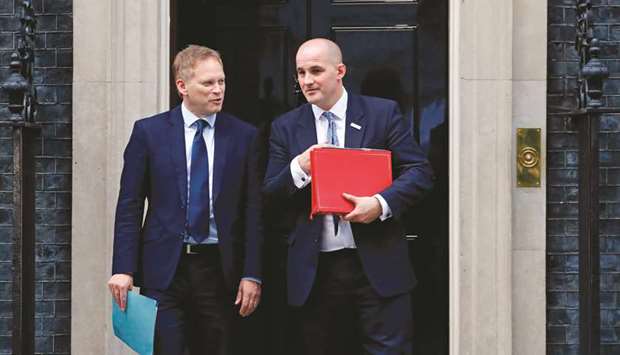Only hours after celebrating the clinching of a Brexit deal in Brussels, Conservative Prime Minister Boris Johnson has urged British lawmakers to vote for it in a special sitting of parliament today.
Johnson insists that the only alternative to his deal is to leave the European Union on October 31 without an exit agreement to smooth the process.
As his predecessor Theresa May found after she issued a similar ultimatum three times, many opposition lawmakers do not accept that dichotomy.
Johnson lacks a majority in parliament and many analysts suggest today’s vote will produce a very close result that could go either way.
Tim Bale, a political scientist at Queen Mary University of London, said Johnson has an “extremely narrow” pathway to a majority for his deal.
Taking account of expected absences, Johnson will require the support of about 320 lawmakers to win votes in the 650-seat Commons, the elected main house of parliament.
Most of Labour’s 244 lawmakers, all 35 Scottish National Party lawmakers and all but one of the 19 Liberal Democrats are expected to vote against the deal.
Many of those opposed to Johnson’s deal retain hopes of finding a better agreement, forcing another referendum, holding an election before Brexit, or even cancelling Brexit.
Some hardline eurosceptic Conservatives — including about two dozen in the party’s influential European Research Group (ERG) — appear to prefer a no-deal Brexit.
The ERG has been an ally of Northern Ireland’s Democratic Unionist Party (DUP) whose 10 lawmakers have vowed to oppose Johnson’s deal after he agreed to different post-Brexit customs arrangements for Northern Ireland from the rest of the United Kingdom.
“Johnson’s deal with the EU is a U-turn extraordinary even by his considerable chameleonic standards,” John Tonge, professor of British and Irish politics at Liverpool University, wrote in a commentary for the unionist-leaning Belfast Telegraph.
Johnson struck the new arrangements to remove the earlier “backstop” provision.
It was designed to protect an open Irish border, and strongly opposed by the DUP and the ERG.
ERG chairman Steve Baker yesterday tweeted that his group will not announce any position on the new deal until today morning.
Bale expects many ERG lawmakers to back the accord because they “fear that this might be their last opportunity to get the kind of deal that they want, and it also gives them the kind of UK economy that they want.”
“There may be a few Labour MPs who are willing to vote for this deal,” Bale said in a video commentary for the think-tank UK in a Changing Europe.
Some of the 21 mainly pro-EU Conservatives who were expelled from the parliamentary party after voting against the government last month “might see this as a way back,” he added.
“So, a deal going through parliament? Tricky, but not completely impossible,” Bale said.
What happens if the deal is voted down — or even if it passes — is also far from certain.
Cautious opposition parties are expected to wait until next week to try to pass a vote for a second Brexit referendum.
There is also speculation Conservative hardliners, or even Johnson himself, could still try to engineer a no-deal Brexit.
And some analysts argue that losing today’s vote could benefit Johnson by allowing him to campaign in an election as the saviour of Brexit.
For all of his optimism at Thursday’s summit talks, once Johnson left the room the remaining 27 EU leaders began preparing for a bumpy ride ahead. “We spent the majority of time discussing scenarios A, B, C and D,” Lithuanian President Gintanas Nauseda reportedly told journalists following the talks, without going into detail.
“No matter how confident Johnson — a rather charming personality — is, nevertheless, everybody is thinking about alternative scenarios,” he added.
If British lawmakers reject the deal today, one immediate question is whether Johnson will seek to delay Brexit beyond his “do or die” deadline of October 31.
He would be required to do so under a new opposition-led law designed to prevent a no-deal Brexit.
European Commission president Jean-Claude Juncker delighted Conservative eurosceptics when he appeared to side with Johnson on Thursday, declaring after bilateral talks on the summit sidelines that “there will be no prolongation.”
But European Council president Donald Tusk, who chaired the EU summit, said he would “consult member states” on any such request, which EU leaders would have to agree to unanimously.
“There should be a reason (for an extension),” Luxembourg Prime Minister Xavier Bettel said yesterday, giving the example of new elections or a second Brexit referendum. “Just to have a new delay is not a reason.” – DPA

Britain’s Transport Secretary Grant Shapps (left) and Conservative MP and Minister of State for the Northern Powerhouse, Jake Berry leave 10 Downing Street in central London yesterday after a meeting of the cabinet.
